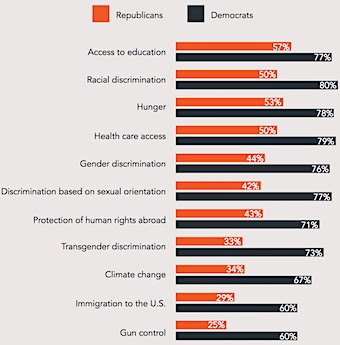Consumers place high expectations on brands and their corporate leaders to take a lead in addressing the most pressing social, environmental and political challenges facing the world today. An overwhelming majority — 95 percent — of stakeholders now believe companies have the ability to shape a better society, and 88 percent believe businesses’ resources and innovations offer vital solutions in solving some of society’s greatest problems, according to a February corporate advocacy report from D.C.-based communication firm APCO Worldwide.
APCO’s “Five Acts of Corporate Advocacy” report, which explored how corporate advocacy work influences consumers’ opinions regarding corporate brands and their reputations, suggests that corporate governance has a clear role in today's divisive political and social climate. 90 percent of stakeholders polled said they expect brands to take a stand on issues affecting the world, with 93 percent stating the best companies are those that do good for their shareholders while also doing good for society. A similar majority — 89 percent — said they think companies should support social issues that are consistent with their business focus and expertise, and 71 percent claimed that it’s acceptable for a company to take a stand on a political or social issue even when it’s controversial.
 Percentage of respondents who say that it’s “always OK” for CEOs to speak out on certain issues. |
The survey also found that whether consumers identify as Republican or Democrat offers a likely predictor regarding what role they feel is appropriate for companies and their CEOs to take on in the course of addressing a social issue.
On a whole, Republicans are more averse to the idea of companies and their CEOs stoking controversy: while 81 percent of Democrat respondents believe it’s acceptable for companies to take a stand on a potentially controversial issue, only 56 percent of Republican respondents believe this; and while 65 percent of Democrats believe it’s important for CEOs to voice strong political opinions, only 47 percent of Republicans agree.
The report found that while this disparity remained consistent across social issues, it increased markedly depending on the issue in question. For instance, while Democrats and Republicans revealed a 20 percent favorability divide regarding whether it was always okay for CEOs to speak out on the issue of access to education (57 percent Republican vs. 77 percent Democrat) other issues, like gun control (60 percent Republican vs. 25 percent Democrat) and transgender discrimination (77 percent Republican vs. 33 percent Democrat) revealed far more polarizing battlegrounds.
When it comes to what a company can do to be a good steward to society, nearly a third of those polled (29 percent) cited good treatment of employees, followed by serving customer needs (21 percent), enacting environmentally friendly operations (15 percent) and ethical corporate governance (12 percent).
And as it turns out, money can’t buy everything when it comes to corporate advocacy. More than three-quarters of all respondents (77 percent) said they actually have more admiration for a company when it uses its business interests and expertise to address a social issue, as opposed to a company that merely donates money to a worthwhile charity (23 percent).
Research for the “Five Acts of Corporate Advocacy” report consisted of a six-month effort conducted by the agency’s global opinion research group APCO Insight. Focus groups in St Louis and Denver were polled during the summer of 2017, consisting of a sample of 1,000 U.S. stakeholders that were deemed “hyper-aware” and “influential,” or members of the general public who both pay close attention to cooperate practices and would be most likely to act on cooperate behavior, be it through a tweet, boycott or support of a cause. An online survey among additional hyper-aware and influential consumers followed in late October.


 Consumers continue to place a premium on corporate responsibility, but they increasingly want to see that responsibility directed toward issues that affect the bottom line, according to a new study from Mission North
Consumers continue to place a premium on corporate responsibility, but they increasingly want to see that responsibility directed toward issues that affect the bottom line, according to a new study from Mission North Not all pressing issues require corporate voice! Brand stewards must must ask why and when their brands should engage, or if they need to engage on a particular issue at all.
Not all pressing issues require corporate voice! Brand stewards must must ask why and when their brands should engage, or if they need to engage on a particular issue at all. Dollar General investors voted in support of a shareholder resolution at its May 31 annual meeting for an independent third party audit of “worker safety and well-being.”
Dollar General investors voted in support of a shareholder resolution at its May 31 annual meeting for an independent third party audit of “worker safety and well-being.” Nonprofits and philanthropists have a unique opportunity to take ownership of conversations surrounding pressing social issues.
Nonprofits and philanthropists have a unique opportunity to take ownership of conversations surrounding pressing social issues.


 Have a comment? Send it to
Have a comment? Send it to 
No comments have been submitted for this story yet.